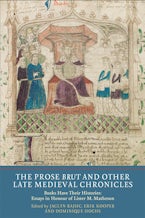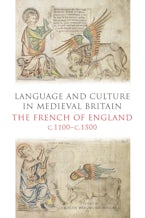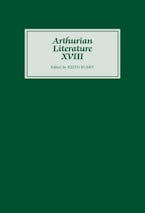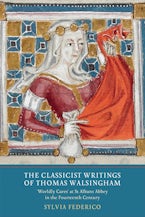
Title Details
314 Pages
23.4 x 15.6 cm
2 colour, 26 b/w illus.
Series: Writing History in the Middle Ages
Series Vol. Number:
5
Imprint: York Medieval Press
The Construction of Vernacular History in the Anglo-Norman Prose Brut Chronicle
The Manuscript Culture of Late Medieval England
- Description
- Contents
- Reviews
First full-length interpretive study of the prose Brut tradition, setting its manuscript context alongside textual analysis.
The prose Brut chronicle was the most popular vernacular work of the late Middle Ages in England, setting a standard for vernacular historical writing well into the age of print, but until recently it has attracted little scholarly attention. This book combines a study of the chronicle's sources, content, and methods of composition, with its manuscript contexts. Using the Anglo-Norman Oldest Version as a touchstone, it investigates the chronicle's social ideals, its representation of women, and its distinctive versions of such elements of British history as the Trojan foundation myth, the ruin of the Britons, the Norman Conquest, and Arthur and Merlin, arguing that its humane, populist vision demands reassessment of medieval popular understandings of British history, and of the presumed dominance of imperialism, next-worldly piety, misogyny, and a taste for violence in late-medieval culture. The book also analyses evidence for the production of the Anglo-Norman Brut, and examines the ways in which its makers and users reconstructed British history through manuscript context, ordinatio and apparatus, annotationand illustration.
Julia Marvin is a Fellow of the Medieval Institute and Associate Professor in the Program of Liberal Studies at the University of Notre Dame.
The prose Brut chronicle was the most popular vernacular work of the late Middle Ages in England, setting a standard for vernacular historical writing well into the age of print, but until recently it has attracted little scholarly attention. This book combines a study of the chronicle's sources, content, and methods of composition, with its manuscript contexts. Using the Anglo-Norman Oldest Version as a touchstone, it investigates the chronicle's social ideals, its representation of women, and its distinctive versions of such elements of British history as the Trojan foundation myth, the ruin of the Britons, the Norman Conquest, and Arthur and Merlin, arguing that its humane, populist vision demands reassessment of medieval popular understandings of British history, and of the presumed dominance of imperialism, next-worldly piety, misogyny, and a taste for violence in late-medieval culture. The book also analyses evidence for the production of the Anglo-Norman Brut, and examines the ways in which its makers and users reconstructed British history through manuscript context, ordinatio and apparatus, annotationand illustration.
Julia Marvin is a Fellow of the Medieval Institute and Associate Professor in the Program of Liberal Studies at the University of Notre Dame.
Introduction: Recognizing the Prose Brut Tradition
A New New Troy: Brut, Rome, and the Foundations of British History
The Community of the Realm: King, Baron, Brother, Stranger
Women with Voices
Arthur
The Continuity of the Realm
Evidence of Production
The Company that Bruts Keep
Ordinatio, Apparatus, and Annotation
History Illustrated
Conclusion: Merlin's Power
Bibliography
A New New Troy: Brut, Rome, and the Foundations of British History
The Community of the Realm: King, Baron, Brother, Stranger
Women with Voices
Arthur
The Continuity of the Realm
Evidence of Production
The Company that Bruts Keep
Ordinatio, Apparatus, and Annotation
History Illustrated
Conclusion: Merlin's Power
Bibliography
"All scholars of late medieval England, and medieval history writing more generally, should read this volume. It is to be hoped that Marvin's superb volume will encourage scholars to give more attention to the" ANPB. NORTHERN HISTORY
"Marvin's book is a vital guide to the Anglo-Norman Prose Brut, indicating the importance of its substantial manuscript corpus. The chapter introductions and conclusions admirably situate the reader within a mass of material. The Introduction helpfully details the book's structure and scholarly importance, while the Conclusion promotes reflection on the differing ways in which history mattered to medieval readers." MODERN LANGUAGE REVIEW
Hardcover
9781903153741
May 2017
£85.00 / $125.00
Ebook (EPDF)
9781787440128
May 2017
$29.95 / £24.99
Title Details
314 Pages
2.34 x 1.56 cm
2 colour, 26 b/w illus.
Series: Writing History in the Middle Ages
Series Vol. Number:
5
Imprint: York Medieval Press


















